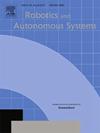Energy-aware multi-robot task scheduling using meta-heuristic optimization methods for ambiently-powered robot swarms
IF 4.3
2区 计算机科学
Q1 AUTOMATION & CONTROL SYSTEMS
引用次数: 0
Abstract
This paper presents a novel approach to address the challenges of energy-aware task scheduling in a collaborative swarm of robots equipped with energy-harvesting capabilities. With a primary focus on task execution timing, reliable task allocation, and efficient utilization of available energy resources, the task-scheduling process is approached with an energy-aware strategy. The developed architecture employs a centralized and autonomous approach that dynamically responds to a sequence-dependent setup time job shop scheduling demand. The proposed method incorporates energy consumption estimation, charging contingency approach, and energy harvesting prediction to minimize overall task execution time. The problem is optimized using Adaptive Particle Swarm Optimization and compared to other well-known meta-heuristic algorithms. A practical illustration of the proposed approach’s real-world utility is demonstrated through a case study scenario conducted within a heterogeneous pick-drop delivery setting inside a warehouse. The study was conducted utilizing the TurtelBot3 burger robot model within the Robotic Operating System and Gazebo simulation environment. Simulation results demonstrate the superiority of the energy-aware solution for multi-robot scheduling and task allocation problems over the energy-unaware methods by a 15 percent reduction in task completion time.
求助全文
约1分钟内获得全文
求助全文
来源期刊

Robotics and Autonomous Systems
工程技术-机器人学
CiteScore
9.00
自引率
7.00%
发文量
164
审稿时长
4.5 months
期刊介绍:
Robotics and Autonomous Systems will carry articles describing fundamental developments in the field of robotics, with special emphasis on autonomous systems. An important goal of this journal is to extend the state of the art in both symbolic and sensory based robot control and learning in the context of autonomous systems.
Robotics and Autonomous Systems will carry articles on the theoretical, computational and experimental aspects of autonomous systems, or modules of such systems.
 求助内容:
求助内容: 应助结果提醒方式:
应助结果提醒方式:


